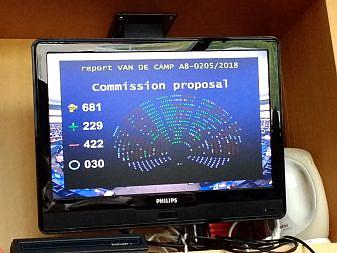European Parliament vote brings no progress for truck drivers
European Parliament vote brings no progress for truck drivers
All of the reports on the EU Mobility Package were today rejected and negotiations in the Transport Committee will have to begin anew. Responding to the vote, SP Euro-MP Dennis de Jong said: “Of course it's a good thing that neoliberal proposals have been rejected, but exploitation of drivers continues and the Parliament has not succeeded in finding a good answer to this situation. It turns out that there's just as little chance of gathering a majority willing to give priority to a real social policy. As ever, the market still takes precedence over people. That's why I persist in advocating a Social and Green Protocol which prioritises people and the environment, putting their interests above those of corporate capital and the market.”
 The votes were extremely confusing and pointed in all directions. “Equal pay for equal work is important for truck and bus drivers, and not only in domestic road transport. For international traffic too, including transit, this should be the rule,” said De Jong. “There seems to be sympathy for this view in the Parliament, but the votes were certainly not clear. The same goes for limiting nights spent sleeping in the cab, and the imposition of strict driving times and rest periods. As for restrictions on abuse of cabotage, almost all variants were thrown out. Actually, it's complete chaos”.
The votes were extremely confusing and pointed in all directions. “Equal pay for equal work is important for truck and bus drivers, and not only in domestic road transport. For international traffic too, including transit, this should be the rule,” said De Jong. “There seems to be sympathy for this view in the Parliament, but the votes were certainly not clear. The same goes for limiting nights spent sleeping in the cab, and the imposition of strict driving times and rest periods. As for restrictions on abuse of cabotage, almost all variants were thrown out. Actually, it's complete chaos”.
De Jong has long argued that the EU Treaty should be amended in order to restrict the market. “As today's chaos showed,” he said, “we need an independent test if the market is being put before social and environmental considerations. That's why I'm convinced that for the 90% in our society who find themselves constantly the victims of unbridled market-think, only a social and green protocol would help. Exploitation caused by market-think demands not cosmetic changes, but constantly backing the interests of the 90%. In the current debate the major, international transport corporations have lobbied hard to keep their labour costs as low as possible. An end must be put to their influence, and as quickly as possible. Only then can the drivers' rights be properly assured.”
- See also:
- Europe
